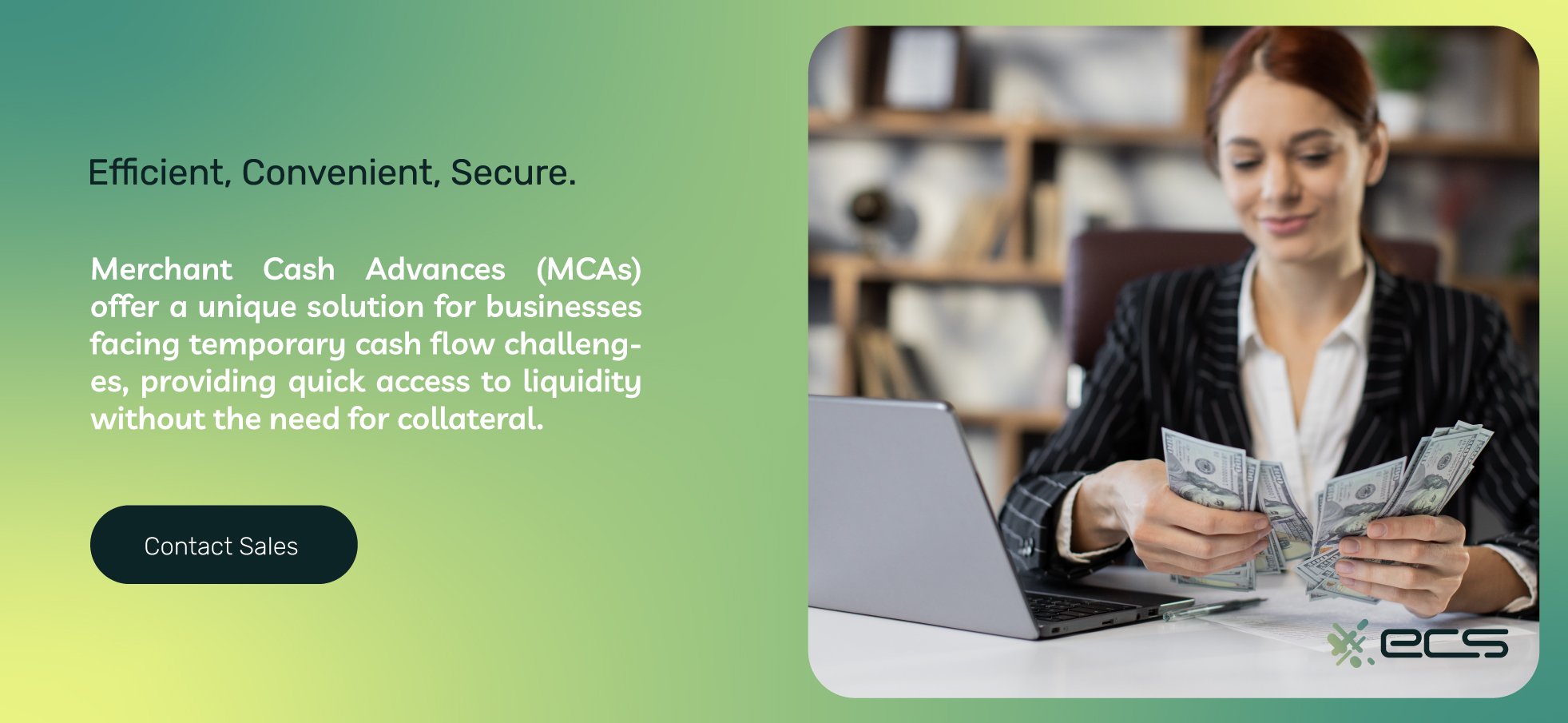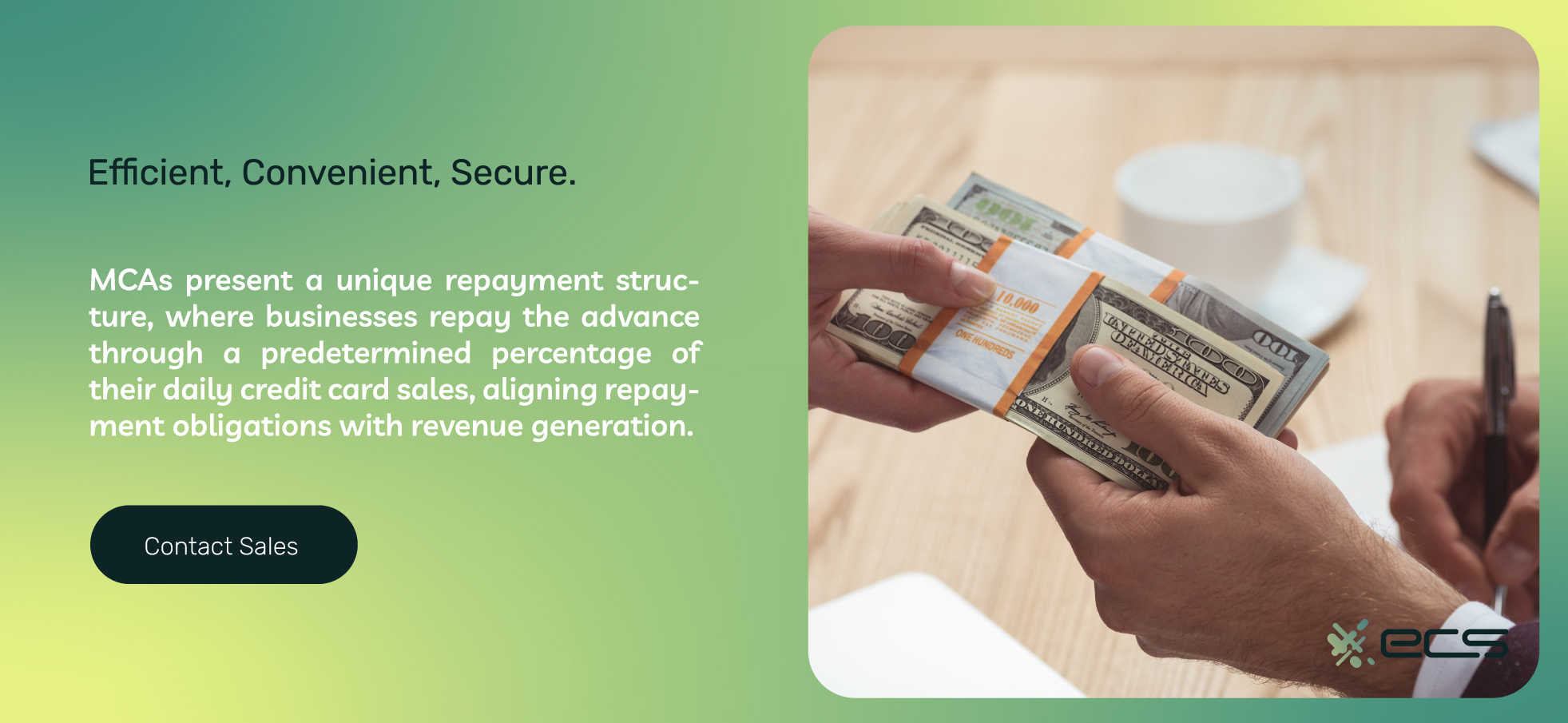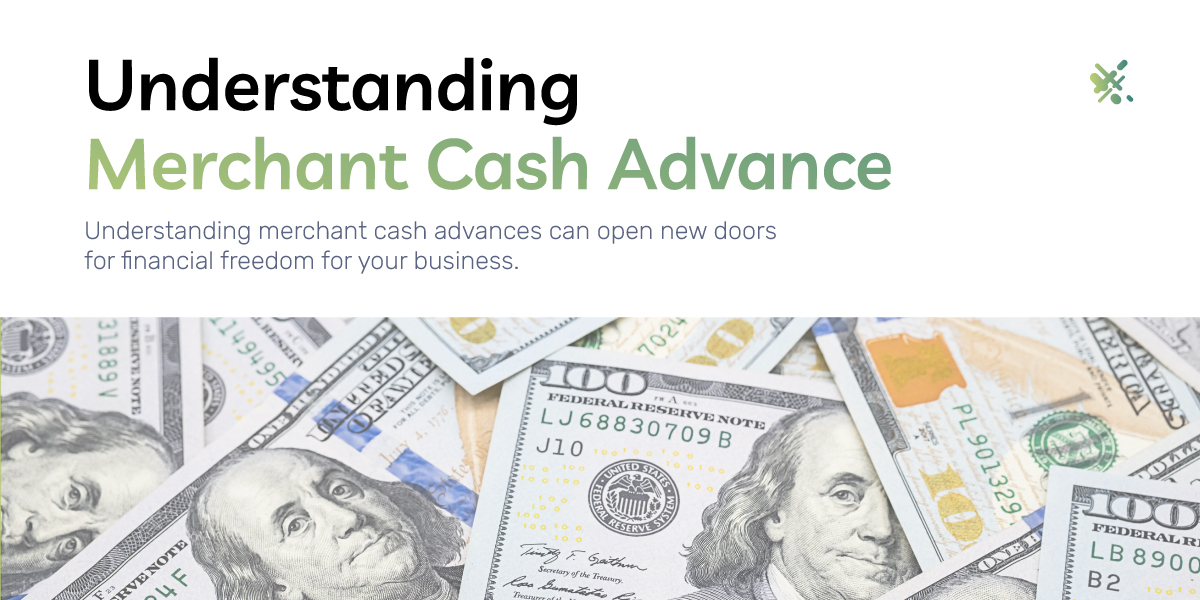Any business can run into cash flow issues from time to time. These issues can be temporary and may only require a quick injection of liquidity. For these situations, there’s a special type of credit known as a Merchant Cash Advance (MCA) designed for small business financing.
An MCA works differently from a typical business loan or a business line of credit. The funding amount you qualify for, the interest paid, and the qualification are all unique to MCAs. If you’re considering a merchant cash advance for quick business funding, it’s important to understand exactly how MCAs work and how they differ from traditional financing.
Armed with this knowledge, you can make the right choice for your business and situation without the risk of making your cash flow situation worse. To help you, we’ll cover an MCA in detail, from how it works to the loan application process. We’ll also cover when it’s right to use an MCA over other financial products.
What Is A True Merchant Cash Advance?
A merchant cash advance (MCA) is an alternative business financing option that differs from traditional loans or credit in many ways. It is an unsecured business funding option that allows business funding without collateral. This means you don’t have to put up any physical assets, which is sometimes common with a traditional lender.
However, sometimes, an MCA will require a personal guarantee if your business does not repay the loan. MCAs sometimes go by other names, such as credit card sales financing or revenue-based financing. These all refer to the same type of short-term business funding as a merchant cash advance.
With an MCA, you receive a large sum of cash upfront once you apply and are approved. Instead of paying the loan back through typical installments, you guarantee the borrowed money using a percentage of future credit card sales via your merchant account.
These payments are automatically deducted on a set schedule, usually daily or weekly, depending on the arrangement you made with the MCA provider.
It’s important to remember that an MCA is not technically considered a loan. This means the provider does not report your payments to any credit bureau. So, an MCA will not build your business credit score. Because of the lower risk for the provider, MCAs have a higher approval rate than most other types of business credit.
Typically, merchant cash advances for small businesses are approved in about 90% of cases. The credit requirements are relatively loose, and most merchants will qualify regardless of their existing credit.
For comparison, small business loans and lines of credit have an approval rate of approximately 65%. This makes MCAs attractive to those with difficulty obtaining other financing due to bad credit or other factors.

How MCAs Work
Since MCAs are designed to deliver cash fast, the process is straightforward and can be completed much faster than a business loan or line of credit.
Below, we’ll outline the typical steps of how the process works from start to finish.
Step 1: Determine How Much Funding You Will Need.
Just remember, an MCA is a short-term loan, and the time to pay it back is usually months. MCAs typically range from $10K to $250K.
Step 2: Seek Out A Merchant Cash Advance Provider
You’ll want to compare MCA providers to determine which one offers services for your specific situation. You’ll also want to check reviews and other sources to ensure you want to do business with them.
Step 3: Qualifying For Merchant Funding
For the application process, you’ll need access to your financial and merchant account processing statements. Have these on hand and ready to go when you apply.
Most MCAs will use an online application process. If you have all your paperwork, applying can take as little as 10 minutes.
Step 4: Review The Offer
Once approved, you will receive your MCA offer, which includes the total amount of cash you will receive and the repayment terms.
You can accept the MCA offer or reject it and request different terms. If accepted, the cash can be delivered the same day or the next day.
Step 5: Receive The Funds
MCAs put very few restrictions on how you can use the funding. So, as soon as you receive the funds, you can use them for any legitimate business purpose.
Step 6: Begin Repayments
When you accept the offer and receive your funds, you’ll set up your repayments. These will generally start within a day after you receive the MCA funding.
Funds are automatically taken from your merchant account, which is tied directly to the MCA provider, who is also your payment processor.
Determining Treu Merchant Cash Advance Rates And Fees
While MCAs are relatively simple, the rates and fees can be confusing since they differ from traditional loans and credit lines.
Instead of an interest rate, merchant cash advances use a repayment metric called a factor rate.
Factor Rates Explained
A factor rate is the number by which the borrowed amount is multiplied. Typical factor rates range from 1.1 to 1.5.
Several criteria, including the amount of the MCA, the time to pay it back, and your financial history, determine the factor rate.
The total amount borrowed multiplied by your factor rate determines the total amount you have to pay back. This does not include any additional service fees that may apply.
MCA Factor Rate Example
For a simple example, let’s say you accept an offer for an MCA totaling $100,000. Your offer includes a factor rate of 1.3.
In this case, 100,000 x 1.3 = $130,000
The total amount you will pay back to fulfill the terms of the MCA is $130,000, plus service fees.

Comparing Factor Rate to APR
Using another example, let’s assume you took out an MCA for $75,000 with a factor rate of 1.3.
First, you determine the total cost of the loan (75,000 x 1.3), which is $97,500.
To calculate your MCA’s APR, divide the difference between your loan amount and the repayment amount by your original loan amount.
In this example, 22,500/75,000,000=.3.
From there, you calculate the annual rate by multiplying .3 x 365 (days in a year)
In this case, that’s 109.5
You get your APR by dividing the annual rate by the days you have to pay back the loan. In this case, let’s use 180 days, which results in a 60.8% APR.
Repaying A Merchant Cash Advance
Unlike a loan, you don’t have a set repayment schedule where you make regular monthly payments to the lender. Instead, the MCA provider automatically deducts from your credit and debit card sales.
Typically, the automatic deductions are directly from your merchant account. These deductions are daily, although they can sometimes be weekly. Your MCA offer determines the amount taken, which is a fixed percentage of your daily card sales.
For example, you will agree that the MCA provider takes 10% of your daily credit and debit card sales per day.
Less often, an MCA agreement can involve a deduction from your bank account instead of through your merchant account. These are called fixed withdrawals, and they are based on a percentage of your monthly debit and credit card sales.
The downside of fixed withdrawals is that if your sales fall unexpectedly, the amount of the MCA deductions doesn’t change. This can leave you worse off than before the loan.
With a plan that deducts a percentage of your daily sales for products and services, you can still pay during slow sales times, although the time to pay back the loan will be longer. This does provide flexible repayment financing since the amount you pay is based on your revenue.
Additional Fees For Merchant Cash Advances
Beyond the factor rate, your MCA will also include additional fees. These fees are generally similar to fees with standard loans.
Typical additional fees for an MCA include:
Origination Fee
Loans will generally have an origination fee, and MCAs are no different. Typically, these fees comprise a percentage, but they can also constitute a fixed amount ranging between $1,000 and $3,000.
Typically, lenders deduct origination fees from your total loan amount before disbursing the funds to you. Carefully study any origination fees to ensure they are not excessive.
Underwriting Fee
Sometimes lenders include this fee with the origination fee or charge it separately. Typically, lenders charge origination fees for the application process, and the amount can vary.
Administration Fee
This is a typical service and is generally a fixed amount. Not all MCAs will have an administration fee, so be aware of this to avoid any surprises or deductions you weren’t expecting.
Overall, fees are typical during an MCA. However, you should carefully examine your loan offer and ask about all the fees that you’ll be paying. Some MCA lenders may try to add additional fees or excessive fees that can make the loan less attractive than you originally thought.
When Should I Use A Merchant Cash Advance?
Now that you understand how a merchant cash advance works consider when they are appropriate.
You Need Immediate Cash
One significant benefit of a merchant cash advance is that you can receive your funds in as little as two days from the time you begin the process. If you need funds immediately, then there are a few other options that are as fast as an MCA.
If you do not need the funds immediately, another type of credit or loan would be more advisable, assuming you qualify and have good credit.

Seasonal Business Expenses
An MCA can benefit businesses that generate a large portion of their revenue during specific seasons or events. You can use an MCA to purchase inventory before a busy sales season or event, maximizing your busy times by having the most inventory on hand.
Fast Expansion Initiatives
Some businesses look to scale quickly depending on their business plans. In these cases, the business generally needs a marketing campaign to kick off its efforts.
Suppose you already have a proven business formula and just need to scale your marketing efforts. In that case, an MCA can help you do this quickly before competitors enter the market or conditions change.
Just make sure to prove your business formula before taking on high-interest debt. You want to ensure your scaling will work first.
When Not To Use A Merchant Cash Advance
An MCA can be perfect when a lucrative opportunity presents itself. It provides an influx of cash so you can make business moves you otherwise couldn’t. However, it isn’t good for situations where your business has underlying cash flow problems or structural problems with the business model.
Taking on high-interest debt to maintain operations without fixing underlying problems will generally just end up with your business worse off than it was before you received the MCA.
If your business is experiencing issues with cash flow due to a problem with the business model, you want to address those issues first. Once you’ve adjusted your business model and developed a better path to profitably, you can consider an MCA to jump-start your efforts.
What Happens If I Can’t Pay Back A Merchant Cash Advance
One of the reasons you want to only use an MCA in the right situations is because of how they are regulated. Traditional loan or usury guidelines do not regulate MCAs because they are not actually a standard type of loan. This means if you default or cannot meet the repayment terms, the consequences can be more damaging to your business than a traditional loan.
Most MCA agreements contain language that prevents you from contesting a judgment should you fail to make the payments. This means you are immediately liable for any money owed, and the MCA provider can start taking legal action to reclaim their money.
If you are in a position where you cannot make the MCA payments, you want to contact your MCA provider as soon as possible. It’s always best to try to work out an arrangement with the MCA provider instead of simply letting the loan or payments default. Your MCA provider may allow you to pause payments for a short period of time.
Another option is to negotiate the terms of the MCA, although this is less common. However, in some cases, it is possible, depending on the amount owed and the status of your business.
Finally, you can refinance your MCA or roll it into another MCA. This is generally not a good option and can quickly create a spiral of debt that you cannot recover from. Overall, if you cannot pay your MCA debit, contact the provider and try to work out an arrangement before you start missing payments.
Pros And Cons Of MCAs
Before considering an MCA to grow your business, consider the pros and cons of one and compare it to other short-term business loans or funding options.
Pros:
Immediate Business Capital
One of the biggest advantages of MCAs is that they provide fast capital for businesses. Most alternative financing options can have long application processes and require extensive documentation. For example, a traditional bank loan like an SBA can take several weeks.
Credit sales business funding options like MCAs can deliver funds to small business owners in two days or less.
Easy Approval Business Funding
Merchant cash advances rely more on monthly sales volumes than on credit history. This means that if you or your business has less-than-perfect credit, you can still access business cash flow solutions such as an MCA.
An MCA finance company will still perform credit checks, but the results are only part of their underwriting requirements.
Very Few Restrictions ON How YOu Use The Funds
The funds from an MCA can be used for virtually any viable business purpose, including different areas of your business or one specific initiative.

Cons:
Higher Costs
An MCA will have a higher interest rate than a traditional bank loan. The annual percentage rates (APRs) are sometimes over 100%, which is much higher than other types of business loans.
No Benefit To Paying The Loan Early
With traditional loans, you can sometimes save money by paying the loan earlier, reducing your total interest. Although, depending on the lender, some loans do have prepayment penalties.
With an MCA, paying the loan early does not result in cost savings; you repay a fixed amount.
Can Impact Cash Flow
While an MCA loan can help with cash flow, the daily repayments can negatively impact your cash flow if you don’t carefully consider the impact on your budgeting.
Carefully weighing the pros and cons of an MCA and using them when appropriate is the key to leveraging this short-term funding option to the fullest.
Frequently Asked Questions About Merchant Cash Advances
Yes. Merchant cash advances use your future credit and debit card sales as your repayment. The repayment withdrawal is directly tied to your business’s credit and debit card transactions and taken directly from your merchant account before it hits your business bank account. Merchant cash advances are provided by a business’s payment processor, unlike a traditional loan provided by a bank or other type of financier.
Merchant cash advances have a fixed repayment percentage from a business’s daily credit and debit card sales rather than a fixed monthly amount, which can be helpful in slow times.
MCAs typically have a higher interest rate than traditional loans. Early repayment has no benefit, and while MCAs can help with cash flow in times of need, repayment could end up being a budgeting burden.
Businesses that need immediate cash, have seasonal business expenses, or have fast expansion initiatives in their business model may benefit the most from a merchant cash advance.
